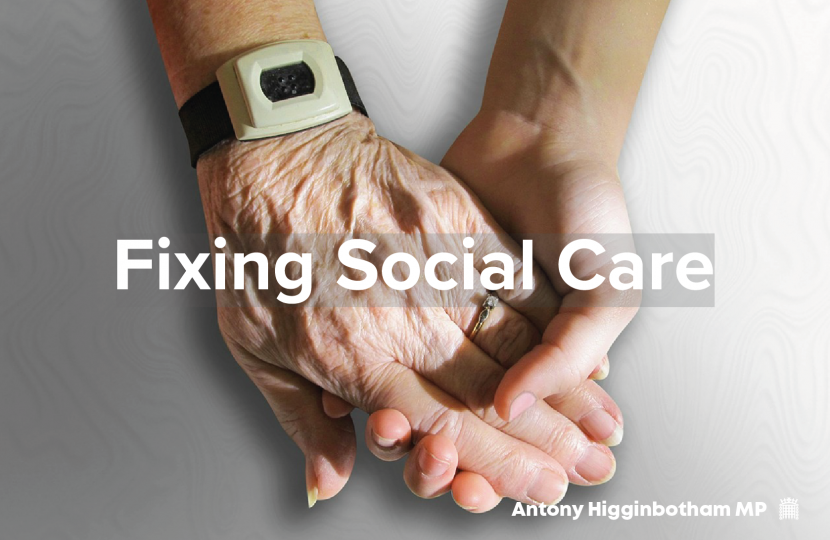
For decades our social care system has been in need of fundamental reform, but the political will to sort it hasn’t been there. Instead, the difficult decisions have been ducked, and the people who have paid the price because of that are our friends, neighbours and family members.
I have experienced this in my own family. The family home sold to pay for the costs of care; no limit on how much a person is expected to pay and so all of their assets gone, which they worked so hard for; and no clear guidance to the standard you can expect. For me and my family, that meant not only did my grandparents have to sell their house, but it also saw my grandad move from care home to care home, until we found one that worked for him.
When I stood on doorsteps in December 2019 I said I would work tirelessly to fix that system. To give people dignity in old age, to fix the injustice of people facing uncapped costs, and put our social care system on a sustainable footing for the future.
This week the Prime Minister announced a scheme to do that. It will mean, for the first time, no one will face the prospects of losing all of what they have worked for. Families will get comfort that they can expect decent care across the whole system. And, most importantly, there will be a much bigger focus on keeping people in their own home for as long as possible.
Where successive Governments have failed, the plan being introduced will provide a new long-term solution for social care, ending the unpredictable and catastrophic care costs faced by thousands. It includes a cost cap of £86,000 over a lifetime, applied irrespective of where you live, how old you are, how much you earn, or your health conditions. All care costs will be covered for anyone with assets under £20,000 and the threshold above which the state stops support will increase from £23,500 to £100,000, meaning anyone with assets between £20,000 to £100,000 will receive state contributions.
But crucially it will offer choice, control and independence to all who need it, by providing a seamless experience of integrated health, care and community support.
Together, this represents an entirely new area of Government expenditure. Billions of pounds a year going into a new system to provide security for every single person. And so I think everyone accepts it needs to be paid for. To suggest otherwise is to ignore the difficult decisions – to lumber the younger generation, not with a funded system, but with increasing amounts of debt with no plan to get rid of it. That would not be the responsible thing to do.
And it’s for this reason that, despite my view that we should keep taxes low, I accepted the need for a new Health & Social Care Levy. However, this is not a direct replacement of National Insurance. The funding base is broader.
Everyone who benefits from the health and social care system should pay in to it, and that’s why this levy will also be paid by those who continue to work beyond the state pension age – much like income tax.
Our businesses too, which need a healthy and sustainable workforce, will be asked to contribute. That is particularly important in the coming months and years as the funding is directed to the NHS to allow it to clear the elective surgery backlog which is impacting millions of people – everything from hip replacements to cataract surgery.
But there are safeguards built into the system. Those who earn more will pay more. And whilst it is right that businesses make a fair contribution, 70% of the money raised from business will come from the largest one percent of companies, with 40% of all businesses paying nothing extra, protecting small and medium sized businesses here in Burnley and Padiham.
I am determined to ensure that local residents across Burnley and Padiham only pay what they can afford to. And that’s why it is right that we ask those with the broadest shoulders, who earn the most, to pay the most.
The measures announced this week, including the new levy to fund them, reflect a watershed moment for our health and social care system. Because it’s not just about recovery as we clear the NHS backlog, but about systematic reform to create a health and social care system fit for the 21st century. One where we care for all and make sure nobody is left behind.

